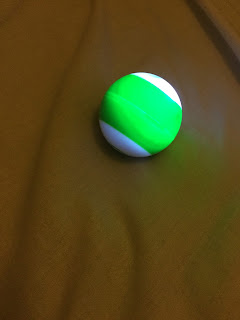It's a ping-pong sized ball, much smaller than the normal Sphero's and approximately half the price. Though slightly less featured, what it has got, is good.
In the box, you get the sphero-mini, a charging cable, as well as packet of mini-skittles and cones. There is no charging station for this one, you charge it taking the outer shell off (it splits into two pieces) and the socket is on the ball inside. Actually, it is quite interesting to see the insides (I know the Spheros SPRK+ have a transparent shell to show the innards) and handle the ball inside, trying to see what it does. The ball is a little slower than the other Spheros, but this is not a problem in my opinion.
There is an app for playing the games, and this is fun to play with; providing control via the app to make the ball move and many features I have yet to explore. Alternatively, the SpheroEdu app, running on a tablet, allows programming via blocks or JavaScript. Had to have a go with writing a JavaScript routine.
The routine just makes the robot go in a square and not really much of a test, but a start. I especially liked the visual display of the sphero-mini's route on the tablet's screen.
I think this little robot, the price is not bad, though less featured than their bigger 'sibling' Spheros it is still good. I would like to see support for Swift in the future but it is early days for this kit and the skittles and cones are a good touch.
All opinions in this blog are the Author's and should not in any way be seen as reflecting the views of any organisation the Author has any association with. Twitter @scottturneruon





Very informative!!!!
ReplyDeleterobot kit
This comment has been removed by a blog administrator.
ReplyDelete